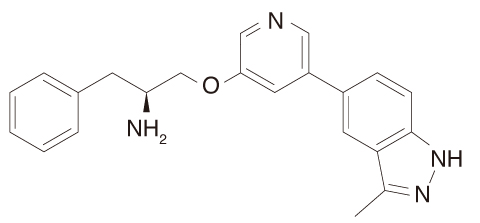
News & Events
News & Events
News
January 09, 2018
Chemical compound A-674563 protects chondrocytes from deterioration

The structure of A-674563
A drug screening of over 5000 compounds by CiRA scientists has discovered a drug compound that could improve current regenerative medicine for cartilage damage. A-674563 protects the degradation of Sox9, the protein most important for the identity of chondrocytes, the cells responsible for articular cartilage production. The study can be read in Biochemical and Biophysical Research Communications.
Arthritic knees and other joint pain is often the result of eroding articular cartilage that covers the ends of bones and lubricates the joint. Cartilage does not naturally heal, so any substantial damage is permanent without medical care. For cases where physical therapy and drug treatments are not enough, patients will undergo cartilage transplants. Autologous chondrocytes implantation (ACI) is a standard procedure in which a biopsy of undamaged articular cartilage is taken from the patient and moved to the damaged area.
"The cartilage we take is never enough to fill the damaged area. We expand the chondrocytes and implant the expanded chondrocytes into the defect," explains CiRA scientist and orthopedic surgeon Tomohito Kobayashi.
The expansion increases the number of chondrocytes and amount of cartilage to fill the defect. Unknown to doctors, however, is why expanded chondrocytes change their character from articular to fibrocartilaginous, a process known as dedifferentiation. Fibrous cartilage is not as lubricious as articular cartilage, thus compromising the recovery. Kobayashi had joined CiRA in hopes of findings ways to preserve chondrocyte character as articular cartilage for better ACI outcomes.
"Several factors have been reported to inhibit dedifferentiation. The discovery of A-674563 suggests a new mechanism that could sustain chondrocyte character," he said.
Overall, the study suggests that adding A-674563 to ACI protocols could increase Sox9 protein levels and reduce dedifferentiation, but Prof. Noriyuki Tsumaki, who managed the study, stressed more work needs to be done before concluding any effectiveness for patient care.
"We need to further analyze mechanisms and to investigate crosstalk with other signals, which would contribute to comprehensive understating of cartilage biology," he said.
Paper Details
- Journal: Biochemical and Biophysical Research Communications
- Title: A-674563 increases chondrocyte marker expression in cultured chondrocytes by inhibiting Sox9 degradation
- Authors: Tomohito Kobayashi1,2, Kaori Fujita1, Takashi Kamatani1, Shuichi Matsuda2, and Noriyuki Tsumaki1
- Author Affiliations:
- Center for iPS Cell Research and Application (CiRA), Kyoto University, Kyoto, Japan.
- Department of Orthopaedic Surgery, Kyoto University Graduate School of Medicine, Kyoto, Japan.






















